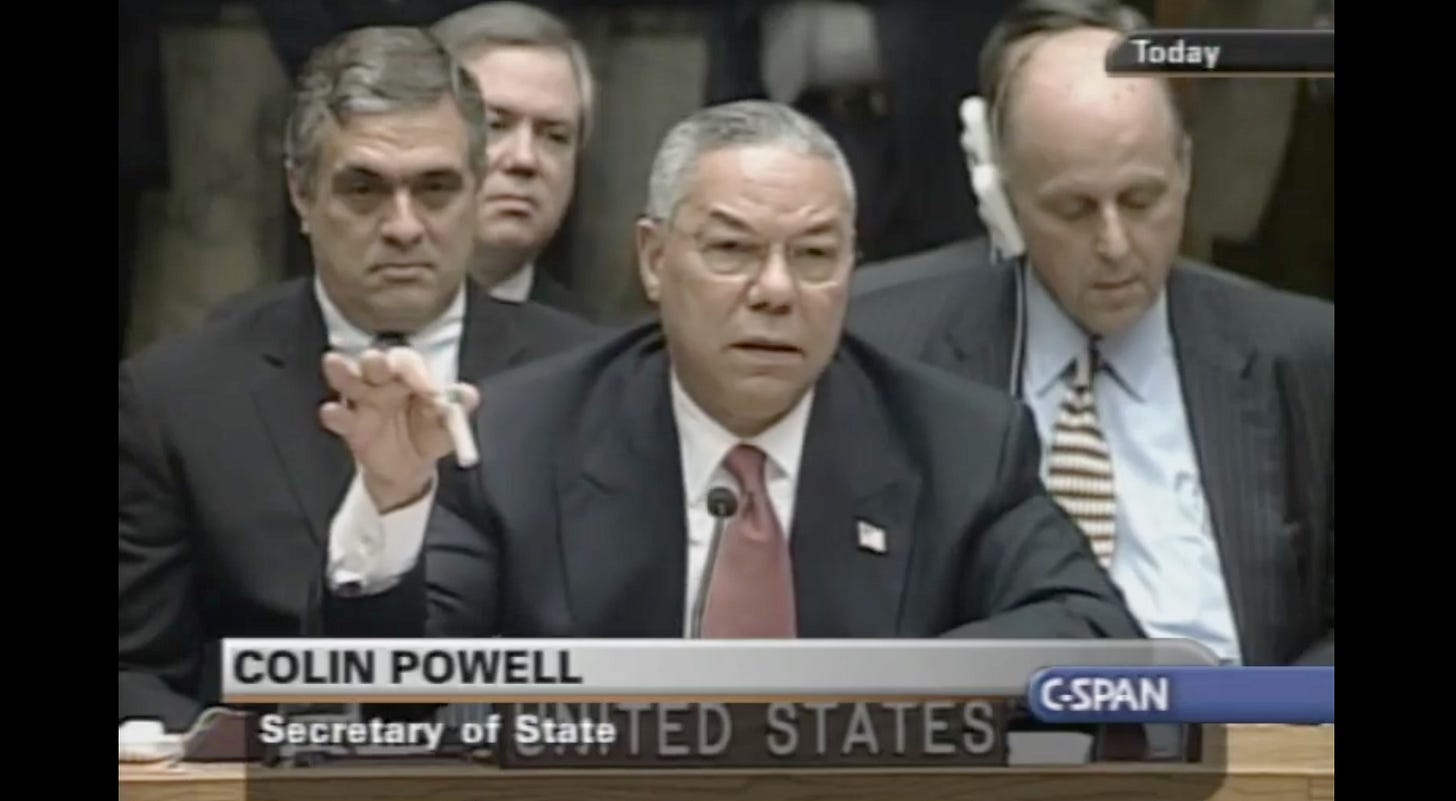Remember Colin Powell's Victims
Tributes are pouring in for the former secretary of state—but we should never forget the vast harm he helped cause.
On February 6, 2003, the day after then-Secretary of State Colin Powell presented the United Nations with what he claimed was evidence of Iraq's possession of weapons of mass destruction, the Washington Post editorial board wrote:
AFTER SECRETARY OF STATE Colin L. Powell's presentation to the United Nations Security Council yesterday, it is hard to imagine how anyone could doubt that Iraq possesses weapons of mass destruction.
The headline on the editorial? "Irrefutable." That word, which Powell used in his speech, was everywhere in the wake of his testimony. "I think Secretary Powell made a very powerful and, I think, irrefutable case today before the Security Council," Joe Biden, then the top Democrat on the Senate Foreign Relations Committee, said. "Unless you believe Iraq’s dismissal that the photos and tapes are fabrications, many of Powell’s conclusions are nearly irrefutable," Slate's Fred Kaplan wrote. Many others, even if they shied away from the specific word, echoed the sentiment. "I don't know how the United Nations felt about Colin Powell's 'J'accuse' speech against Saddam Hussein," the Washington Post's liberal columnist Mary McGrory wrote. "I can only say that he persuaded me, and I was as tough as France to convince."
It is important to remember all of this as the tributes pour in today for Powell, who has died at 84 following complications from COVID-19. Powell is being hailed as a trailblazer, a patriot, a man of integrity and honor:
His UN presentation rested on a pile of lies and deliberate distortions, including from Powell himself. But it did what it was supposed to do: shored up the case for war among the establishment class who found George W. Bush's neocon ravings to be a bit gauche, but who saw in Powell a man they could get behind. As McGrory put it in the aforementioned column, "Of course, Bush chose Powell to make the case before the United Nations. He has no one else who so commands the country's respect — or the world's."
Years later, in an interview with journalist Robert Draper, Powell reflected on his decision to back the war rather than resign and come out against it—something which would have thrown the march to war into complete disarray:
"But I knew I didn’t have any choice,” Powell told me. “What choice did I have? He’s the president.”
It was as simple as that, apparently. An equally telling answer can be found later in Draper's article, in which he reports Powell as saying, “The more I think about it, the more I realize it’s important to keep the job.”
We all know what happened after that. Powell kept the job, Iraq was turned into a slaughterhouse, and the world is still paying the price. Powell expressed vague contrition for the role he played, and that was seemingly enough. When he endorsed Barack Obama for president in 2008, it was seen as an incredible victory for Obama, the man who had run on an ostensibly anti-Iraq platform. When he endorsed Biden in 2020, nobody batted an eye. As we have come to discover time and time again, the American establishment does not consider the deaths of millions of people in the Middle East—or most other places in the world, for that matter—important enough to dent anyone's reputation too much.
Want more blogs like this? Subscribe to Discourse Blog for as little as $8/month
There is a bitter irony in the fact that Colin Powell died at the hands of a virus that has been perpetuated by leaders who decided that their own political power was more important than the preservation of human life, because that is exactly the fateful decision he himself made in 2003. If he is to be mourned today, then the people whose deaths he helped cause in service of a lie should be mourned as well.





